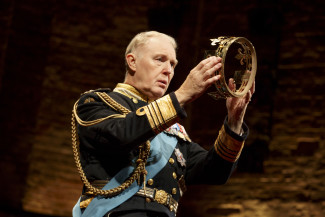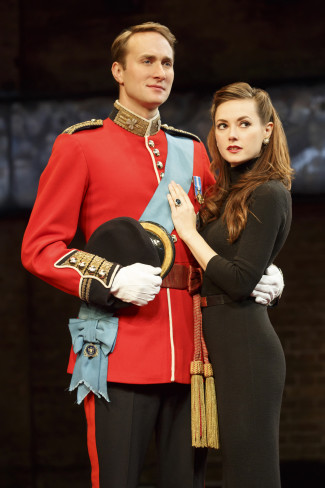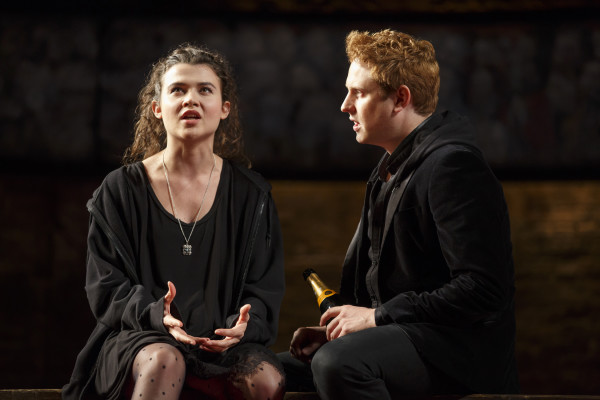REVIEW: ‘King Charles III’ imagines future of British monarchy

NEW YORK — Mike Bartlett’s new play, King Charles III, imagines life after the death of Queen Elizabeth II. This somewhat morbid premise yields surprising wonders and thoughtful scenes on the future of representative government in the United Kingdom. Thanks to an anchoring performance from Tim Pigott-Smith and an austere directing style from Rupert Goold, the play is one of the strongest new entries on Broadway. It’s a head scratcher in all the right ways.
King Charles III begins with the funeral of Queen Elizabeth II, the present monarch who has served in this top position for decades. Theatergoers will likely have fresh memories of Helen Mirren’s Tony-winning performance in The Audience, which re-imagined the weekly audiences between Elizabeth and the many prime ministers she has worked with, everyone from Winston Churchill to Margaret Thatcher and Tony Blair. King Charles III is cut from the same theatrical fabric. Bartlett seems fascinated by the royal family and finds a seeming depth behind the celebrity lives and pomp and circumstance.
Upon Elizabeth’s death, Charles (Pigott-Smith) ascends to the throne and almost immediately finds himself at odds with responsibilities of the top position. When the House of Commons and House of Lords pass a controversial law that will restrict press freedoms, the new king sees an opportunity to make a stand. Prime Minister Evans (Adam James) is enraged that the king would go against the will of the people (or at least the will of their elected representatives). He and the king have a heated tete-a-tete that eventually spills out into the public sphere.
Anthony Calf is Mr. Stevens, the leader of the opposition in parliament who plays politics between King Charles and the prime minister. Deep down, he cannot stand behind the monarch’s decision to object and aligns himself with Evans. At the performance this reporter attended, Peter Bradbury filled in for Calf.

Technically, British law gives the king or queen the power to accept or reject the decisions of parliament. Without the monarch’s signature, enactment does not occur — at least that’s the way theatergoers will understand the system after reading the helpful notes in the Playbill. So, when King Charles decides not to sign the press-freedom bill, the ministers head back to their colleagues and try to circumvent the monarch. This action leads the country into a morass of confusion and protest, and King Charles sees no other action than to dissolve the entire parliament.
This “future history” play covers many interesting themes, chief among them the eclipsing of the British monarchial empire and the transition into a fully representative government. Bartlett’s clever premise asks some uneasy questions. In some ways, King Charles III is a hero for press freedom, the only person willing to stand up for a principle that seems to be a basic tenant of a democratic United Kingdom. However, his actions, which sidestep the purported voice of the people, harken back to the days of monarchial rule and top-down governance that the United Kingdom has grown away from. Who is the hero? Who is the villain? Who will win? Does everyone lose?
The king’s family, who will undoubtedly be familiar to the audience, includes princes William (Oliver Chris) and Harry (Richard Goulding), plus Kate (Lydia Wilson) and Camilla (Margot Leicester). Princess Diana (Sally Scott), Charles’ first wife and the princes’ mother, who infamously died in a car accident in the 1990s, appears as an apparition when the king is ruminating his available options. Having these recognizable characters in the play is not a cheap celebrity trick; they actually provide a personalization to the central figure of King Charles III. This newly ascendant monarch is a man of the public but also a man who cherishes his family life. He seeks the counsel of his wife, Camilla; is haunted by the ghost of his first wife, Diana; and yearns for the acceptance of his sons.
Pigott-Smith brings much depth to the role. His Charles is an unsure leader, someone who paces back and forth in nervousness whenever the spotlight is turned on him. He also struggles with the transition of standing in the shadows for decades behind his mother and now having to lead his country, symbolically at least, into the future. He’s not a born leader but one who learns quickly and adapts to the surroundings. When he finally takes a risk on the press-freedom bill, he decides to jump in with the hope that the parliamentary leaders will buckle. Pigott-Smith displays this battle between nervousness and confidence in an understated, yet effective performance that reveals a lot of personal character and inner turmoil for the monarch.

Goulding stands out among the supporting actors. His Harry is written somewhat like a cliche outcast, someone who feels suffocated by the royal treatment and wants a life away from the stately palaces. He finds solace in Jess (Tafline Steen), a young woman he falls for, even though the staff at Buckingham Palace doesn’t think she’s worthy of the younger prince. Goulding plays the character like a determined youth, someone grasping for direction and purpose. It’s a solid performance layered with the right balance of angst and protest.
Chris and Wilson are regal as the royal couple. Their characters have some of the most severe arcs throughout the play, and both actors are able to bring credibility to their respective roles. Chris, who appeared in One Man, Two Guvnors on Broadway, plays William as someone who dotes on his father and respects the king’s wishes; however, he increasingly becomes suspect of the country’s direction and the erratic behavior of his father. Wilson’s Kate smiles for the cameras and offers a gracious welcome to Jess, no doubt seeing parallels to her own path into the royal family. However, she eventually becomes a more prominent player in the family’s political life, ensuring decisions are made that secure the future of her and her husband’s legacy.
Leicester’s Camilla doesn’t appear on stage for too long, but when she’s providing advice to the king, the actress is able to couple her common-sense wit with a believability that makes the role one of the more interesting ones in the play. Camilla feels pulled between the love she has for her husband and the unique role she plays with the princes. James and Bradbury (normally Calf) are expert at delivering their political and personal messages to the king, although their roles are never explored outside the chambers of Buckingham Palace. They are pawns in the play, providing Charles with a test of how far he will take his power.
Bartlett’s words are written with such vibrancy. At times, the characters slip into recitations seemingly pulled from the pages of William Shakespeare. This clever device elevates the royals and their storyline, almost to the point where King Charles III feels like a Henry IV or Richard II. Close one’s eyes, and listen to the monologues and dialogue. When the characters offer an aside to the audience, it’s as if the Bard is supplying the words. If not for the modern-day references, the material would feel Elizabethean (the other Elizabeth).
Goold is stark in his direction, imbuing the play with a no-frills style and Greek-chorus atmosphere. Characters enter and exit through brick walls and then ascend an elevated stage. At times, the company stands around the perimeter offering slowly choreographed movements that heighten the drama and supply more energy to the proceedings. The way Goold stages the Diana ghost scenes is particularly powerful. What could have felt like a cheap theatrical device instead is quite haunting, with the shrouded apparition walking across the stage along a diagonal beam of light, no doubt maddening King Charles and weighing heavy on his decision-making. Theatergoers will surely think of Macbeth.
King Charles III, which plays a limited engagement at the Music Box Theatre through January, is an expertly realized British import that takes a morbid premise and makes wonders out of some interesting, engaging hypotheticals. This is probably not the way the British monarchy will evolve; however, it makes for an interesting night at the theater to ask so many what-ifs.
By John Soltes / Publisher / John@HollywoodSoapbox.com
- King Charles III
- By Mike Bartlett
- Directed by Rupert Goold
- Starring Tim Pigott-Smith, Anthony Calf, Oliver Chris, Richard Goulding, Lydia Wilson, Tafline Steen, Sally Scott, Tom Robertson, Miles Richardson, Margot Leicester, Nyasha Hatendi and Adam James
- Running time: 2 hours, 40 minutes
- Currently playing the Music Box Theatre at 239 W. 45th St. in Manhattan. Click here for more information on tickets.
- Rating:





